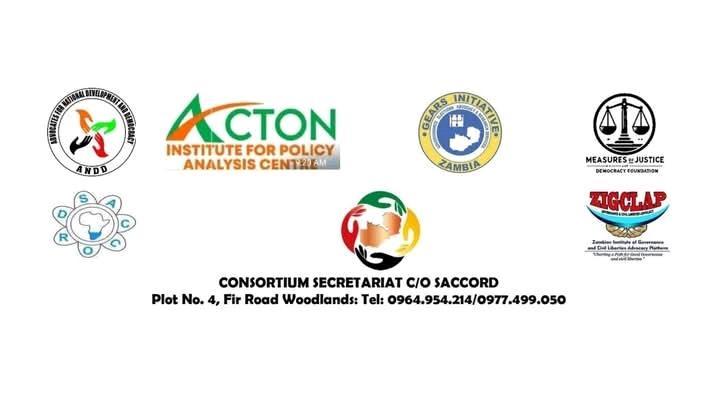Africa-Press – Zambia. The Constitution of Zambia (Amendment) Bill No. 7 of 2025 has become a flashpoint in the country’s democratic discourse, with a consortium of civil society organisations warning that while some provisions are well-intentioned, others threaten to reverse hard-earned democratic gains. The Consortium, coordinated by SACCORD, has called for urgent revisions to the Bill before it is tabled in Parliament.
In a detailed submission, the Consortium argues that the Bill contains provisions that may weaken judicial authority, reduce electoral fairness, and centralize political power. They say the amendments, as currently framed, are inconsistent with the Constitution’s core values of justice, inclusivity, and separation of powers.
A key concern raised by the Consortium is the provision that allows a political party to retain a parliamentary seat even if its candidate’s election is nullified due to malpractice. This, they argue, undermines the authority of the judiciary and creates a dangerous precedent that rewards electoral misconduct.
“When courts nullify an election, the people expect a fresh vote not a secret substitution by the same party,” said Isaac Mwanza, Executive Director of the Zambian Civil Liberties Union (ZCLU).
The Consortium is also alarmed by provisions that restrict political parties from replacing candidates who resign or are disqualified during the nomination process. They say this could be exploited to eliminate competition, especially for opposition parties, and may lead to unopposed victories in constituencies.
Further, the introduction of a Proportional Representation (PR) system for women, youth, and persons with disabilities while progressive on the surface has been criticised for its lack of transparency. Under the proposed law, representatives would be selected from party lists rather than directly elected by the public, raising fears of elite control and exclusion of independents.
“This system risks becoming a reward scheme for party loyalists,” said Francis Chipili of the Zambia Institute of Governance and Civil Liberties Advocacy Platform (ZIGCLAP). “It must include a mechanism for independent candidates to participate.”
The Consortium also challenged the government’s decision to increase the number of parliamentary seats from 156 to 259 without publishing the Electoral Commission of Zambia’s (ECZ) delimitation report. They argue that stakeholders need access to this information to make informed contributions.
“We cannot support such a major change in representation without knowing where the new seats will be or why they are needed,” said Arthur Muyunda of SACCORD.
Another controversial provision in Bill No. 7 is the reintroduction of Members of Parliament into local councils. Civil society groups argue that this violates the principle of separation of powers by turning legislators into participants in executive functions at the local level.
“MPs are supposed to provide checks and balances not to sit on the very councils they should oversee,” said George Shonga of the Measures of Justice and Democracy Foundation.
The Consortium also expressed disappointment at the Bill’s failure to address the long-standing issue of appointing ministers from outside Parliament. Despite repeated campaign promises by the current government to end this practice, the proposed amendments maintain the status quo.
In addition, the Bill fails to revise the legal definition of “discrimination” in Article 266 of the Constitution, despite a Constitutional Court ruling that found it inconsistent with human rights protections under Article 23. The Consortium views this as a blatant disregard for judicial rulings and constitutional compliance.
On the issue of presidential election petitions, the Consortium maintains that the current 14-day timeline is too short for fair adjudication. They support the Judiciary’s earlier recommendation to extend this period to 45 days to ensure due process without creating a power vacuum.
The civil society organisations also criticised the proposed changes allowing internal party replacements for nullified seats. They say this sidelines voters, turns the democratic process into an internal party affair, and denies citizens a voice in choosing their representatives.
“Replacing elected officials through backdoor club elections is undemocratic and disrespects the will of the people,” said Patrick Kaumba of the GEARS Initiative Zambia.
Despite these criticisms, the Consortium acknowledged that some elements of the Bill are commendable. These include reserved seats for women, youth, and persons with disabilities provided they are implemented with fairness and accessibility for all, including independent candidates.
Furthermore, the Consortium urged the government to reopen the constitutional reform process to wider public consultation. They emphasized that constitutional changes must reflect the will of the Zambian people, not merely the interests of political elites.
“We stand ready to support the process, but only if it is inclusive, transparent, and focused on strengthening not weakening democracy,” concluded Samuel Banda of Advocates for National Development and Democracy (ANDD).
For More News And Analysis About Zambia Follow Africa-Press







